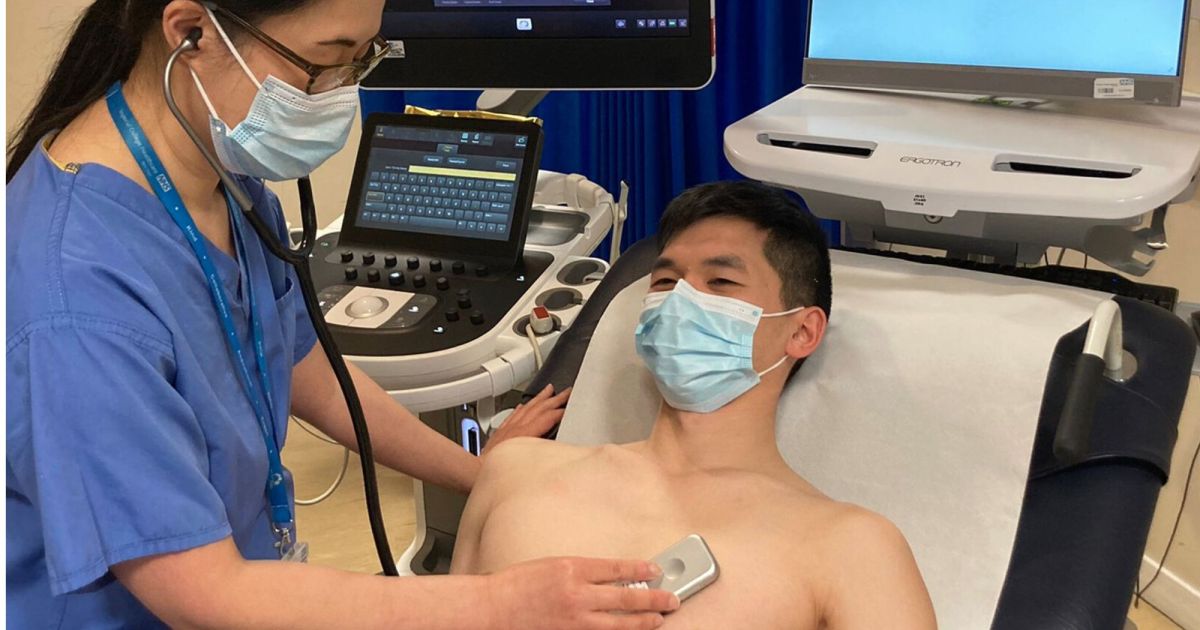Science
AI Stethoscope Revolutionizes Heart Disease Detection in Seconds

A new AI-powered stethoscope is transforming how heart disease is detected, promising results in mere seconds. This innovative device, developed by Eko Health, has been integrated into the healthcare system in the United Kingdom as part of the TRICORDER study led by Imperial College London and the Imperial College Healthcare NHS Trust. It is capable of identifying three significant heart conditions: heart failure, atrial fibrillation, and valvular heart disease.
The stethoscope, roughly the size of a playing card, employs a single-lead ECG sensor and an array of microphones to record phonocardiogram (PCG) waveforms. This data is then analyzed through advanced algorithms to detect abnormalities in heart activity and blood flow. The device connects to a smartphone app via Bluetooth and transmits data to the cloud, enabling healthcare professionals to access patient information quickly.
Efficiency and Clinical Impact
The AI stethoscope can reportedly diagnose heart issues in just 15 seconds, making it an efficient tool for general practitioners across the country. As a Class IIa medical device, it is authorized for regular use without requiring written consent from patients. Initial trials have shown that the device provides reliable results, taking recordings from the upper left sternal border on the chest.
According to research published in the BMJ Open journal, the algorithms governing the device have demonstrated high statistical performance, consistent with international validation studies. The study involved over 200 GP surgeries and covered more than 1.5 million patients. Notably, patients examined with the AI stethoscope were approximately 3.5 times more likely to be diagnosed with atrial fibrillation and nearly twice as likely to receive a diagnosis for heart valve disease.
Aiming for Early Detection
The primary goal of this technology is early detection of heart problems, allowing patients to receive timely, life-saving interventions. Heart failure affects around one million patients in the UK, yet it is often detected too late; approximately 70 percent of cases are identified only when individuals require emergency care. Professor Nicholas Peters, a senior investigator at Imperial College London and consultant cardiologist at Imperial College Healthcare NHS Trust, emphasized that the device allows for the detection of three serious heart conditions in a single examination.
The potential economic benefits of implementing this technology in primary care are substantial. The National Health Service (NHS) estimates that the AI stethoscope could save the system around £2,400 per patient by reducing the need for unplanned emergency visits. With over three million patients already enrolled in the TRICORDER trial program, the NHS anticipates that the device could eventually lead to healthcare savings exceeding £100 million for the UK government.
This AI-powered stethoscope signifies a significant advancement in cardiac care, blending technology and medicine to enhance patient outcomes and streamline healthcare processes. As the trials continue, the impact of this device on heart disease diagnosis could reshape patient care standards and set a new benchmark for medical technology.
-

 Technology4 months ago
Technology4 months agoDiscover the Top 10 Calorie Counting Apps of 2025
-

 Health2 months ago
Health2 months agoBella Hadid Shares Health Update After Treatment for Lyme Disease
-

 Health3 months ago
Health3 months agoErin Bates Shares Recovery Update Following Sepsis Complications
-

 Technology3 weeks ago
Technology3 weeks agoDiscover 2025’s Top GPUs for Exceptional 4K Gaming Performance
-

 Technology2 months ago
Technology2 months agoElectric Moto Influencer Surronster Arrested in Tijuana
-

 Technology4 months ago
Technology4 months agoDiscover How to Reverse Image Search Using ChatGPT Effortlessly
-

 Technology4 months ago
Technology4 months agoMeta Initiates $60B AI Data Center Expansion, Starting in Ohio
-

 Technology4 months ago
Technology4 months agoRecovering a Suspended TikTok Account: A Step-by-Step Guide
-

 Health4 months ago
Health4 months agoTested: Rab Firewall Mountain Jacket Survives Harsh Conditions
-

 Lifestyle4 months ago
Lifestyle4 months agoBelton Family Reunites After Daughter Survives Hill Country Floods
-

 Technology3 months ago
Technology3 months agoUncovering the Top Five Most Challenging Motorcycles to Ride
-

 Technology4 weeks ago
Technology4 weeks agoDiscover the Best Wireless Earbuds for Every Lifestyle





















